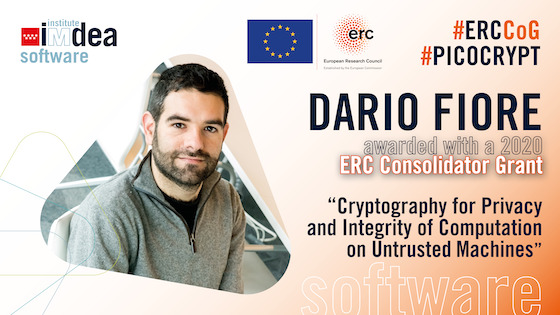Research Results
The European Research Council (ERC) announced today the awardees of its latest Consolidator Grant call for mid-career researchers. Its funding is part of the EU’s current research and innovation programme, Horizon 2020, and worth in total €655 million.
The ERC has granted 327 Consolidator Grants in 2020 to researchers from 23 countries, of which 22 were given to Spanish proposals (consult statistics). The proposal of the IMDEA Software Institute researcher, Dario Fiore, with the project “Cryptography for Privacy and Integrity of Computation on Untrusted Machines (PICOCRYPT)” is one of them.
Dr. Fiore’s proposal, planned for five years, has a budget of €2 million, which will allow him to consolidate his research team and make far-reaching advances. PICOCRYPT becomes the third ERC grant awarded to researchers from the IMDEA Software Institute.
The PICOCRYPT project
Due to phenomena like the ubiquity of the Internet and cloud computing, it is increasingly common to store and process data on third-party machines. In spite of its attractive aspects, this trend raises a number of security concerns, including: How to ensure that the results computed by third parties are correct (integrity) and no unauthorized information is leaked (privacy)? The current way to deal with these problems is to trust third parties under legislation guarantees. This approach assumes that third-party machines stay honest all time, even if they get hacked! This is unrealistic and contradicted by the numerous security incidents that are regularly reported.
Instead, Dr. Fiore’s view is that it should be possible to store and process data on untrusted machines without risking for privacy and integrity and without the need of trusting these machines. Recent trends in cryptography promise solutions to realize this vision but the existing generation of protocols is limited due to its high costs and its poor support to emerging applications such as data stream processing. The grand challenge of this project is to invent a new generation of cryptographic protocols for commputing securely on untrusted machines in a way that is cost-effective and suitable for future application scenarios.
The solutions provided by the PICOCRYPT project will have the potential to generate a paradigm shift in the way privacy and integrity are ensured and will have an impact on the world of information technology by making delegated computing more secure not only for citizens but also for public and private organizations that, due to current risks, may give up using these services.
